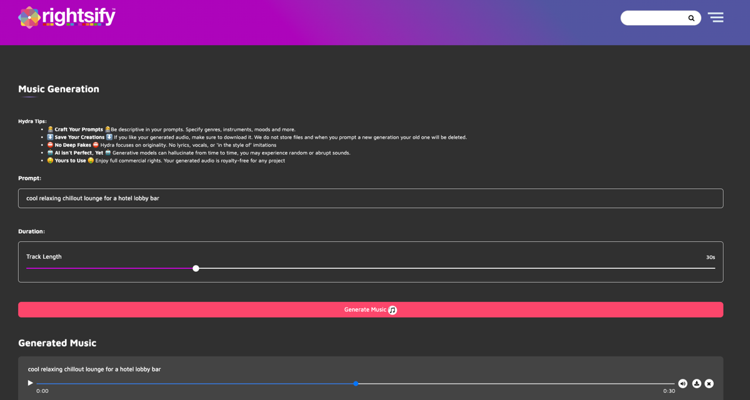Rightsify Launches Hydra to Enable High-Quality AI Music Generation


Photo Credit: Rightsify (Hydra interface)
Music licensing firm Rightsify has announced it is opening its datasets and models to allow anyone to generate high-quality AI music from just text prompts. The dataset has been trained exclusively on Rightsify-owned catalog, making the company the first music rights holder to turn its expansive music library into an AI model open for everyone to use.
Any AI-generated audio using Hydra will be unencumbered by licensing snags and free to use for any purpose a business, artist, or creator wishes. “Hydra represents a major breakthrough in AI music generation,” Rightsify CEO Alex Bestall told Digital Music News. “It’s not just about the advanced technology; it’s about breaking down the barriers in music production and empowering any individual or business to create high-quality music.”
“With Hydra, businesses, artists, and creators can experience frictionless generation, hassle-free licensing, and freedom of use. This model is a game-changer for the industry, offering a music generation machine without the complexities of traditional music licensing.”
How Does Hydra Work?
Rightsify says its Hydra model was trained exclusively on a dataset of 60,000 songs with more than 300 unique musical instruments, using NVIDIA’s powerful A100 GPUs. Users can make music from a length of ten seconds up to two minutes in length—far more than the typical 15-second excerpts most music models can generate.
The company said alongside full-blown tracks, the model can also be used to generate sound effects like white noise, binaural beats, rain, ocean sounds, and other elements for sound design or functional music projects. It is also capable of generating samples and loops inspiring and streamlining an artists’ work.
“We encourage users to be detailed in their prompts and provide context as well as instrumentation, key, and tempo to improve results, Bestall notes. “It’s worth experimenting, too, to see what Hydra can do, especially in genres you might not expect, like indie pop, bossa nova, or synthwave. Hydra does great with guitars, in part because it’s trained on well labeled stems, so it’s capable of generating a wide range of music effectively.”
The Hydra model is backed by Rightsify’s copyrights, allowing users to utilize their output for any commercial use case, including scoring videos, releasing on DSPs, or incorporating into a video game. Both businesses and creators can get started with the free plan with up to 10 generations or the $99/month plan that includes unlimited track generations for the first 30 days. Following that period, the plan allows for 1,000 track generations per month after.
Rightsify says the model is also available as an API for developers who want to incorporate generative AI music creation into their own products. Any developer can utilize this API to build generative music applications legally, without clearing rights with third-party copyright holders first.
“At Rightsify, we prioritize originality and ethical standards in AI music generation,” says Bestall. “Our approach ensures that all music created through Hydra is genuinely unique, not deep fakes or imitations of existing works. This approach allows users to confidently generate music at scale, free from legal concerns or infringement issues.”
Link to the source article – https://www.digitalmusicnews.com/2023/12/22/rightsify-launches-hydra-to-enable-high-quality-ai-music-generation/
Recommended for you
-
sktome Podcast Equipment Bundle, BM-800 Recording Studio Package with Voice Changer, Live Sound Card – Audio Interface for Laptop Computer Vlog Living Broadcast Live Streaming
$53,99 Buy From Amazon -
JBL Professional 305P MkII 5-Inch 2-Way Powered, Active Monitor Speakers for Near Field Music Production, Studio Monitor, Desktop Computer, Hi-Fi Audio. Sold as Pair, Black
$238,00 Buy From Amazon -
E-mu Emulator II – Large Original 24bit Multi-Layer WAVe/Kontakt Samples/Loops Studio Library 10.3GB;
$14,99 Buy From Amazon -
Jiayouy Guitar Effect Pedal Footswitch Toppers Foot Nail Cap Protection Cap for Guitar Effect Pedal Protection Cap Colorful 20PCS/Set
$9,99 Buy From Amazon -
Broadway Gift Co. Banjo Miniature Replica Bright White 1.5 x 3 Resin Stone Tabletop Figurine
$12,99 Buy From Amazon -
HIP-HOP Acapellas – Large authentic WAVE/Kontakt Samples/Loops Studio Library
$14,99 Buy From Amazon -
Gold Tone M-Bass25 25-Inch Scale Acoustic-Electric MicroBass with Gig Bag
$599,99 Buy From Amazon













Responses